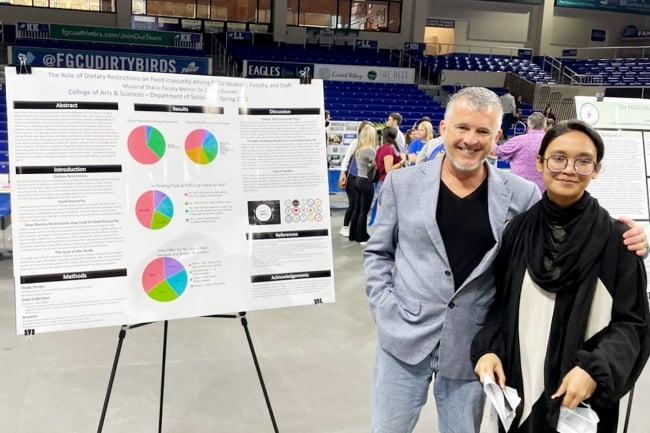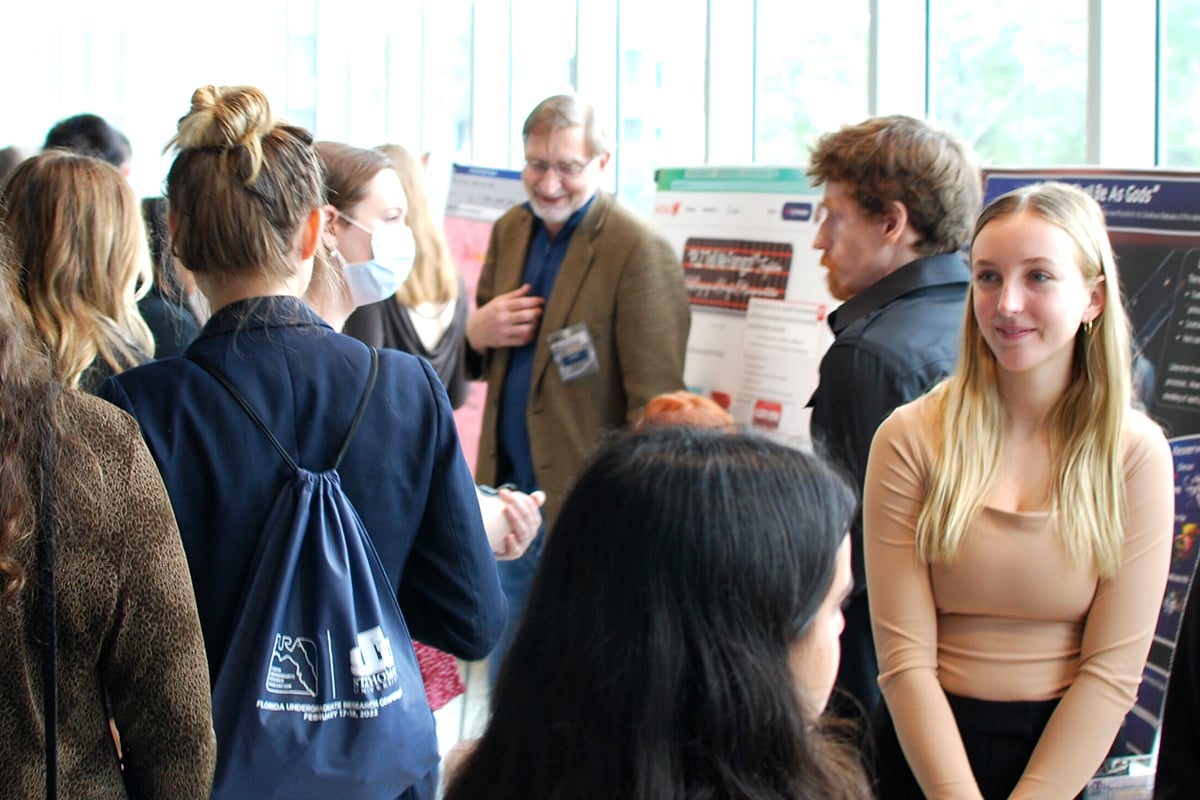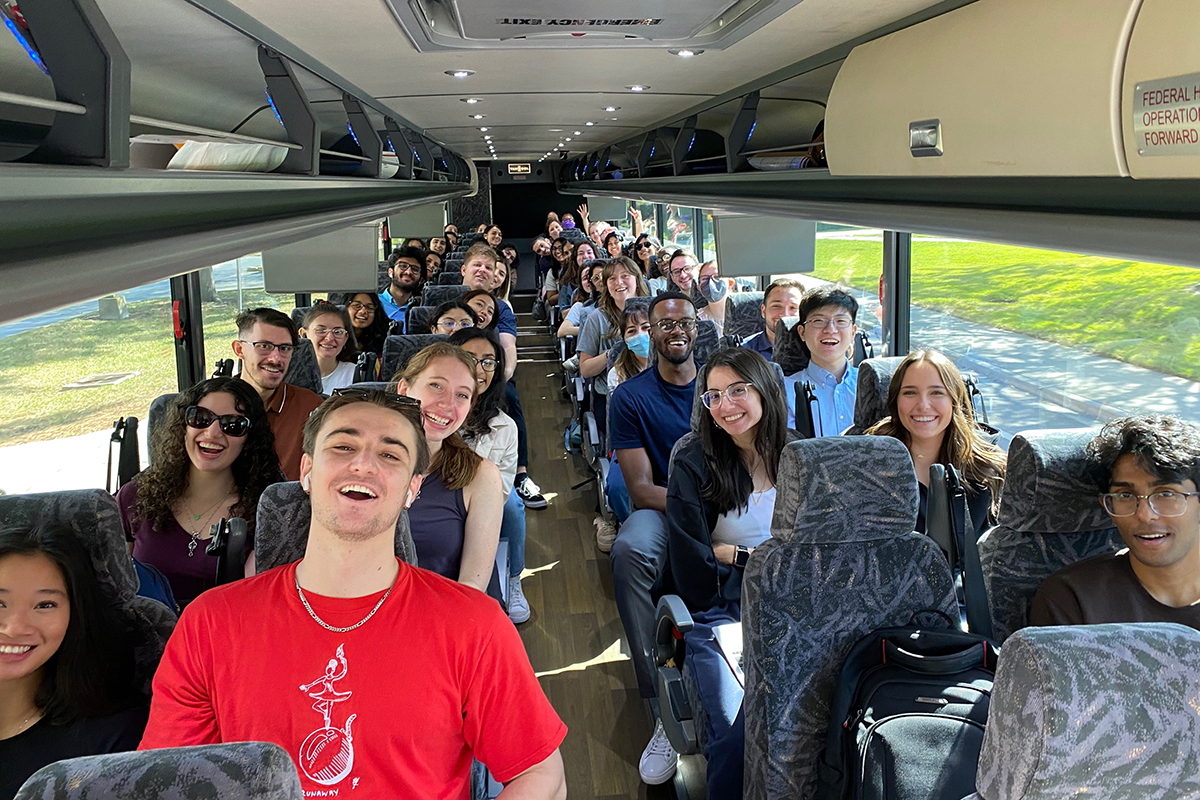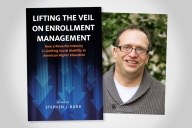You have /5 articles left.
Sign up for a free account or log in.

Musarrat Shaira (right) is joined by her faculty mentor, Charles Gunnels, as she presents her research on how dietary restrictions are tied to food insecurity.
Musarrat Shaira
Musarrat Shaira knew she wanted to major in sociology, but she wasn’t sure what career options it would lead to. Then during a class in her first year at Florida Gulf Coast University, she was exposed to the idea of using research to address social justice issues.
“I think I’m interested in research, but I don’t know much about it,” Shaira recalled telling her professor.
She soon became involved in a research project that used a visual display to convey data about gender inequalities, domestic violence and sexual assault. That inspired Shaira to launch her own project the following year compiling survey data to demonstrate how religious, ethical or allergy-driven dietary restrictions can lead to food insecurity among college students if dining halls don’t accommodate them. Now a senior, Shaira has submitted her research to the Florida Undergraduate Research Journal, a statewide publication that gives baccalaureate scholars a voice for their research. The article is currently under review, and she anticipates it will be published next year.
Shaira said participating in academic research as a first-year student really boosted her confidence.
“As a freshman, I had impostor syndrome; I didn’t believe in myself,” she said. “Doing all this research helped me understand that I can also equally do what other people are doing.”
Undergraduates are often limited to publishing work in journals produced by the institution they attend, meaning their research is typically read by a relatively small population. But for students like Shaira, the Florida Undergraduate Research Journal provides an opportunity to share work more widely.
First published last year, the journal is the latest effort of the Florida Undergraduate Research Association, which is dedicated to promoting undergraduate research. FURA connects students from Tallahassee to Miami, allowing them to publish and present their work to a statewide audience.
Something for Every Student
The opportunity to publish is available to students across all disciplines, said Melodie Eichbauer, a professor of medieval history at Florida Gulf Coast and chair of the FURA executive board.
“Undergraduate research is something that every student should be engaged in, in one way, shape or form,” Eichbauer said. “You never know where life is gonna take you as a student, and wherever it does—whether you go to grad school, whether you go into employment—research is at the heart of everything we do, right? It is the boneless chicken breast of curriculum.”
Students sometime have trouble seeing themselves as bona fide researchers, Eichbauer said. One of FURA’s goals is to help identify and remove any barriers they may face, providing access for as many students as possible.

Students from across the state of Florida gather to share the results of their research at the Florida Undergraduate Research Conference.
Florida Undergraduate Research Association
The association coalesced unofficially in 2008, when administrators and faculty from across Florida held a symposium on engagement and undergraduate research. The first conference was held at the University of North Florida in 2011, but the association didn’t officially become a recognized nonprofit until 2019.
At FURA’s annual conference, which is held in a different location in the state each February, students can share work with one another, receive feedback from faculty, talk with graduate school recruiters and participate in professional development workshops. A similar event, called Posters at the Capitol, is held in Tallahassee each January.
“For some students, the [FURA] conference is the only one outside of their campus symposium that they may ever go to. For others, this could be a gateway drug, so to speak, where they say, ‘Oh my gosh, this was phenomenal. I want to keep doing this,’” Eichbauer said. “So having the opportunities to break down those barriers is really what we’ve been thinking about.”
Kim Schneider, former chair of FURA and assistant vice provost in the division of student success and well-being at the University of Central Florida, said the research opportunities created by FURA help empower students.
“They become part of academia … They recognize that people value what they’ve been working on,” Schneider said. “For any researcher, they often spend hours and hours on one project and it’s only been seen by a handful of colleagues. But at the Florida Undergraduate Research Conference, they’re surrounded by others interested in what they’re doing.”
FURA’s funding comes predominantly from institutional memberships. Currently, 21 Florida colleges and universities, public and private, pay $300 annually to be part of the association. Membership provides discounts for students, faculty and staff to attend both the conference and the state symposium, which promotes faculty discussion on strengthening and developing undergraduate research. It also covers participation in Posters at the Capitol, where students present their research to state lawmakers.
Registration fees are kept relatively low. In 2023, students and faculty from member institutions paid $55, and those from nonmember colleges paid $60; students whose institutions do not cover the cost of attendance can apply for fee waivers. The location of the conference varies from year to year, and each lasts two days, so only one night in a hotel is typically needed.
National Growth
Similar conferences exist in other states, including the Southern California Conference for Undergraduate Research, the Georgia Undergraduate Research Conference and the Idaho Conference on Undergraduate Research. While the groups that put on such events share the aim of increasing accessibility, Lindsay Currie, executive officer of the Council on Undergraduate Research, an organization of international members that supports mentored undergraduate research, described FURA as “a bit more sophisticated.”
“These kinds of regional and state conferences are relatively popular,” Currie said. “Being able to offer something at a regional level is really critical. Anytime you can take a $600 flight out of the equation, that means more students will have access to that conference. And it’s just not something we can do at the national level.”
“The difference again, for FURA, is it’s more than just a conference for the students,” she added.

University of Central Florida students travel to the Florida Undergraduate Research Conference.
University of Central Florida
Support for undergraduate research has been on the rise across the country over the last 10 to 15 years.
“[Undergraduate research] is getting put into more and more mission statements of campuses, where there is this focus on where students are going postgraduation,” Currie said. “Undergraduate research has definitely been proven to be one of the best ways for students to leave prepared, because it is giving them that hands-on experience.”
The Council for Undergraduate Research holds its own annual national conference, at which attendance has jumped over the past two decades, from 2,600 in 2002 to 3,500 in 2022. Membership has grown even more dramatically during that period, from 3,354 to 13,532.
“A lot of this was spurred by the work of George Kuh, who named undergraduate research as one of the top high-impact practices for helping students get to graduation,” Currie said.
And in an era when higher education budgets are tight and undergraduates are focused on postgraduation outcomes, it’s especially important to ensure students are “ready to go and have the experiences they need,” she said. “In the last few years, especially on the statewide level … undergraduate research is definitely a tool that we have seen campuses leverage.”
Looking Forward
Eichbauer said it’s particularly helpful because today’s research-oriented graduate programs often expect students to arrive with more research experience than they did “many moons ago” when she was a grad student.
“Graduate schools now are looking for students who are giving conference presentations,” she said. “They are looking for students who are publishing. So making sure opportunities are available for students to have them is critical.”
Though Shaira has yet to graduate, she is already seeing the benefits of her research experience. Her participation in the FURA network prompted her to apply for fellowships and present at conferences across the country.
She became the first FGCU student to win acceptance to the Public Policy Leadership Conference at the Harvard Kennedy School her freshman year and this year attended the Public Policy and International Affairs Junior Summer Institute at Carnegie Mellon University.
“I had some of my classmates telling me personally that my story really inspired them to start their own project,” she added.
Shaira intends to participate in February’s FURA conference, where she hopes to share not only the results of her research but also the impact it’s had on the FGCU campus. Illustrating the link between students with dietary restrictions and food insecurity, she said, has led to clearer labeling of ingredients in campus dining halls. That makes it easier for Shaira and other Muslims practicing halal—as well as Jewish students who keep kosher, vegans, vegetarians, pescatarians and students with food allergies—to follow their diets while still getting enough to eat.
She hopes her work leads to similar changes on other campuses as well.
“The topic I have been looking at, it’s so underrepresented,” Shaira said. “People across Florida can have access to this research paper and know that dietary restrictions can also lead to food insecurity. I wanted to have people learn more about inclusivity. I’m so happy to see that they started making progress.”








